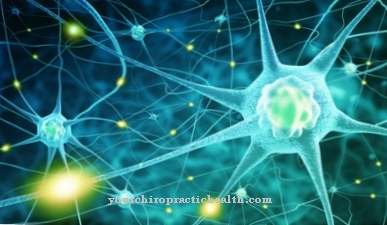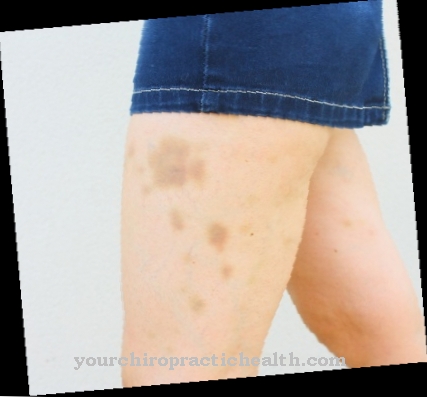Tremble, Twitches or tremor is mostly an unconscious shaky or swaying motor movement of parts of the body. Shaking hands, in particular, are often a clear characteristic of the symptom.
What is tremor?

As already noted, trembling is mostly an unconscious or involuntary motor activity in which the body as a whole or individual parts of the body trembles or has a slightly swaying or trembling effect. The tremor itself mostly has its origin in the opposing action of muscle groups (antagonists). The hands, jaw, head, feet and voice are often known for being particularly strong.
Tremors can come in different forms. For example, it can have a shaky or shivering effect, when it is very cold or more vibrating and rhythmic, as in Parkinson's. The tremor can occur either at rest or in motion.
One can further differentiate the following forms of trembling:
1. Tremors when moving any part of the body
2. Tremors when resting or holding a part of the body
3. Trembling when focused on a target
4. Trembling when holding an object
5. Trembling during specific motor actions, such as making music
causes
Trembling in the cold or freezing is usually harmless if there is no subsequent frostbite. Freezing is even a protective mechanism in order to supply the body with more heat through muscle contraction. However, tremors can also be a symptom of an illness. Typical representatives of this are Parkinson's, hyperthyroidism, epilepsy, stroke and multiple sclerosis.
But excessive consumption of alcohol, nicotine, drugs, coffee, tea and various medications can also trigger tremors. Psychological disorders such as anxiety disorder or panic attacks are also a possible cause. Hereditary predispositions are a rare cause of the tremor, but this has not yet been thoroughly researched.
Diseases with this symptom
- Parkinson's
- multiple sclerosis
- Anxiety disorder
- alcoholism
- Frostbite
- stroke
- Dumping syndrome
- Wilson disease
- Hyperthyroidism
- epilepsy
- Dystonia
- Graves disease
Complications
Shivering is a common body reaction to cold. In most cases, the tremors will go away whenever the body can warm up again. If the cold is not treated directly, hypothermia can occur if the tremor is very prolonged. However, this is not a problem if the patient is treated immediately with heat.
The tremors can, however, also occur in connection with muscle diseases and are often a result of alcohol abuse. In such cases, a doctor should be seen to examine the symptom and treat it if necessary. Frequent tremors often indicate an overactive thyroid.
This can be treated with medication. Parkinson's is also a cause of tremors and unfortunately cannot be treated directly. A distinction is made here between different manifestations of the disease, which differ in the frequency of the tremors.
If there is still pain in the wrist while trembling, this may indicate a pinched nerve, a doctor must be called urgently. It can also arise from stress or nervousness and is normal in such situations. After the situation, the tremor will go away on its own.
When should you go to the doctor?
Usually, tremors in individual extremities or the entire body are a defense reaction of the body. Excessive cold causes individual muscle regions to tremble, so that the temperature is maintained. However, tremors in certain parts of the body can also be caused by unusual stress. However, the tremor should go away on its own after a few hours.
If this is not the case, a doctor should be consulted as soon as possible. Only in this way can potentially serious underlying diseases be avoided or identified and treated at an early stage. If the tremor disappears in individual parts of the body after a few hours, there is a high probability that the muscles are harmless. The trembling of individual body parts at short intervals can occur due to a serious underlying disease. A visit to the doctor should therefore not wait long, because serious complications can only be avoided through early treatment.
For this reason, the following applies: People affected who suffer from tremors in their muscles after unusual physical activity do not need to consult a doctor. After a few hours, the tremor should go away on its own. However, the situation is different if the tremor occurs for no apparent reason. In such a case, a visit to the doctor is absolutely inevitable. Any underlying illnesses can only be identified early enough through a medical examination.
Doctors & therapists in your area
Treatment & Therapy
Doctors usually do not see a doctor if they are trembling. Nevertheless, in the context of another illness, this symptom can be determined by a doctor and a diagnosis can be included. Depending on the cause, treatment of the tremor is possible in addition to the underlying disease.
Possible therapeutic measures include taking medication such as beta blockers or botulinum toxin. In addition, motor techniques and forms of training have been successfully used against tremors in the past. Tremors associated with epilepsy or Parkinson's disease cannot yet be cured. Only the alleviation of the symptoms is guaranteed by the doctors.
Outlook & forecast
In most cases, the tremor is not a serious symptom that must be treated by a doctor. If the shivering occurs due to cold, the symptom will go away as the patient warms up. However, hypothermia can occur if the person concerned is exposed to cold temperatures for a long period of time.
If the patient regularly consumes alcohol or other drugs, the tremors can also arise from it. Withdrawal helps to limit and treat the symptom.
If the tremor occurs suddenly, it may be due to another underlying condition. In this case, the further course of the disease depends on the exact cause. In the case of Parkinson's, only very limited treatment is possible, in which the tremors cannot be completely eliminated.
Quivering often occurs in stressful situations and when nervous, which is a common symptom. In this case, psychotherapeutic treatment can also be initiated to reduce the complaint. With colds or flu, tremors can also occur, which, however, disappear again together with the underlying disease.
You can find your medication here
➔ Medicines to calm down and strengthen nervesprevention
In order to avoid or prevent tremors, you should try to lead a stress-free and relaxed life. Regular sport and exercise in nature and in the fresh air also help. A healthy diet should also be aimed for. Too much alcohol, smoking and drug use should be avoided. Reducing coffee can be helpful as well.
You can do that yourself
Trembling can have various causes and should therefore always be clarified by a doctor. Depending on the cause, various home remedies and measures can alleviate the symptoms. In the case of nervous tremors, breathing exercises and relaxation techniques (yoga, physiotherapy, massages, etc.) can help. However, stimulating drinks with caffeine should be avoided. Herbal teas (e.g. with lemon balm, fennel or chamomile), juice spritzers or buttermilk are better.
A warm bath relaxes and quickly dissolves the tremors. Suitable natural products include chamomile, valerian, hops and lavender. Taken in the form of tablets, tea or drops, these remedies reduce tremors and generally improve your general well-being. Trembling in the hands can be reduced by cooling the hand cuffs and avoiding alcohol, nicotine and coffee.
Often the tremor is also due to exhaustion, which can be alleviated by relaxation and bed rest. If the complaints are based on psychological stress, they must be worked through in order to achieve long-term improvement.Patients with a previous illness should always have conspicuous tremors clarified with the attending physician in order to avoid serious complications.






.jpg)




















